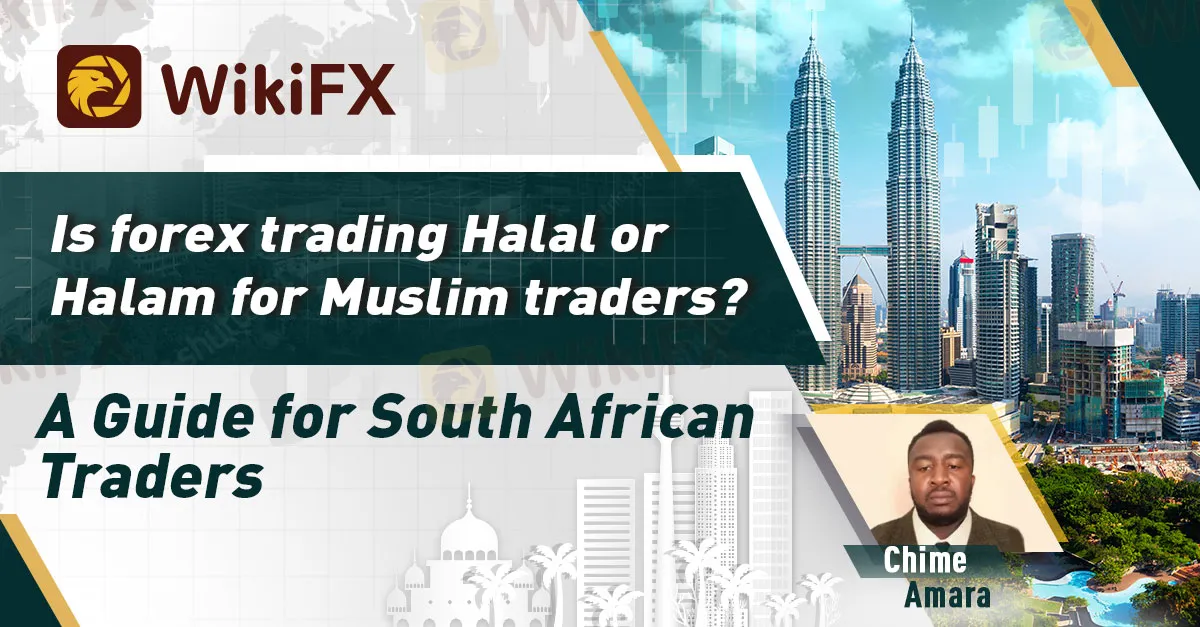简体中文
繁體中文
English
Pусский
日本語
ภาษาไทย
Tiếng Việt
Bahasa Indonesia
Español
हिन्दी
Filippiiniläinen
Français
Deutsch
Português
Türkçe
한국어
العربية
Is forex trading Halal or Halam for Muslim traders? A Guide for South African Traders
Abstract:Forex trading deals with buying and selling of currencies in the global market. The forex market is the largest and most liquid financial market in the world, with an estimated daily trading volume of over $5.1 trillion. In South Africa, forex trading has gained popularity in recent years, with many traders interested in exploring this market. However, for Muslim traders, the question arises as to whether forex trading is Halal or Haram (permissible or prohibited) according to Islamic law. In this article, we will explore this question in-depth and provide a guide for South African Muslim traders.

By: Chime Amara

What are Halal and Haram in Islamic Law?
In Islamic law, Halal refers to actions or practices that are permissible according to Shariah (Islamic law). Haram, on the other hand, refers to actions or practices that are prohibited by Shariah. The concept of Halal and Haram extends to all aspects of life, including finance and business.
Forex Trading and Islamic Law
Forex trading involves buying and selling currencies, which may involve the payment or receipt of interest or Riba. In Islamic law, Riba is prohibited, and any transaction that involves Riba is considered Haram. Riba refers to any increase or excess that is received or given in a loan or debt, whether in cash or kind.
In traditional forex trading, interest is paid or received on trades that are held open overnight, which may be considered Riba. Therefore, forex trading may be considered Haram for Muslim traders who adhere to Shariah law.
Islamic Forex Trading - Swap-free Accounts
To address the issue of Riba, Islamic forex trading accounts were introduced, also known as Swap-free accounts. These accounts are designed to comply with Islamic law by eliminating the payment or receipt of interest. In Islamic forex trading accounts, positions are not held open overnight, instead, they are closed before the end of the trading day. Therefore, no interest is paid or received, and the transaction is considered Halal.
Islamic forex trading accounts may also charge a commission instead of interest to cover the costs of maintaining the account. This commission is fixed and agreed upon in advance and is not based on interest rates.
Guidelines for South African Muslim Traders
South African Muslim traders who wish to engage in forex trading should follow the following guidelines to ensure that their transactions are Halal:
A. Choose an Islamic Forex Trading Account: South African Muslim traders should choose an Islamic forex trading account that complies with Shariah law. These accounts are also known as Swap-free accounts.
B. Avoid Margin Trading: Margin trading involves borrowing money from a broker to trade. This may involve paying interest on the borrowed amount, which is considered Haram. Therefore, South African Muslim traders should avoid margin trading and only trade with their funds.
C. Avoid Leveraged Trading: Leveraged trading involves trading with a larger amount of money than what is available in the trader's account. This may involve paying interest on the borrowed amount, which is considered Haram. Therefore, South African Muslim traders should avoid leveraged trading and only trade with their funds.

Disclaimer:
The views in this article only represent the author's personal views, and do not constitute investment advice on this platform. This platform does not guarantee the accuracy, completeness and timeliness of the information in the article, and will not be liable for any loss caused by the use of or reliance on the information in the article.
Read more

WikiFX Review: Is FxPro Reliable?
Founded in 2006, FxPro is a reputable UK-based broker, trading on various market instruments. In this article, we will help you find the answer to one question: Is FxPro reliable?

Geopolitical Events: What They Are & Their Impact?
You've heard many times that geopolitical events have a significant impact on the Forex market. But do you know what geopolitical events are and how they affect the FX market? Let us learn about it today.

Why Do You Feel Scared During Trade Execution?
Trade execution is a pivotal moment for traders. It is when analysis turns into action, and potential profits or losses become reality. However, for many traders, this moment is accompanied by fear. Why does this happen, and how can you address it?

WikiEXPO Global Expert Interview: Simone Martin—— Exploring Financial Regulation Change
In the midst of financial innovation and regulation, WikiGlobal, the organizer of WikiEXPO, stays abreast of industry trends and conducts a series of insightful and distinctive interviews on pivotal topics. We are delighted to have the privilege of inviting Simone Martin for an in-depth conversation this time.
WikiFX Broker
Latest News
ASIC Sues Binance Australia Derivatives for Misclassifying Retail Clients
Geopolitical Events: What They Are & Their Impact?
Top 10 Trading Indicators Every Forex Trader Should Know
WikiFX Review: Is FxPro Reliable?
Malaysian-Thai Fraud Syndicate Dismantled, Millions in Losses Reported
Trading frauds topped the list of scams in India- Report Reveals
Why Do You Feel Scared During Trade Execution?
WikiFX Review: Something You Need to Know About Markets4you
Revolut Leads UK Neobanks in the Digital Banking Revolution
Fusion Markets: Safe Choice or Scam to Avoid?
Currency Calculator


